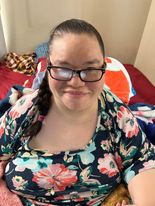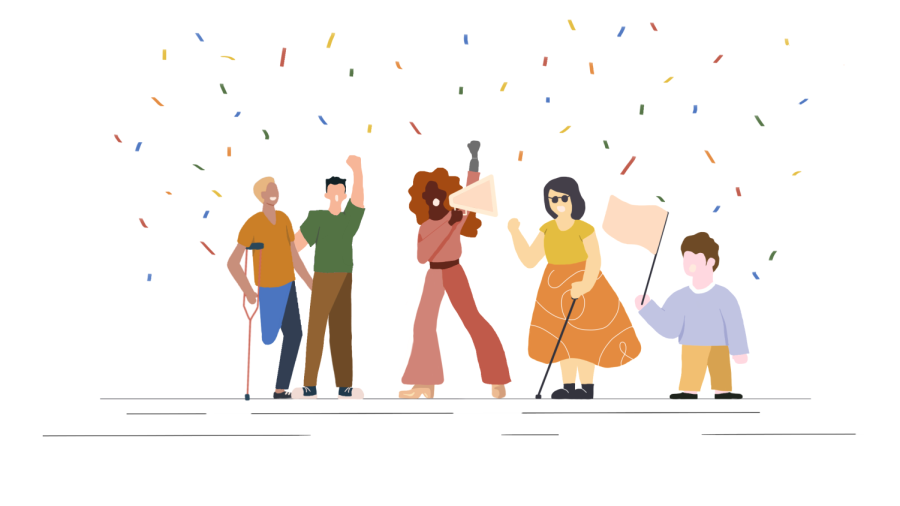The Power of Self-Advocacy
Shannon Hines’ last inside scoop on acceptance
It is difficult to be a person with a disability in an uneducated community. This is made harder when dealing with life’s special moments including school, work, social events and everything in between.
For people with disabilities, learning to speak up for themselves can be a challenge.
So how can people support those with disabilities in standing up for themselves? They can encourage people with disabilities to learn self-advocacy skills.
We will investigate self-advocacy and its effects on people with disabilities. This is a concept that requires digging deep to show that people with disabilities can learn to express themselves even if it may take a long time.
Twenty years ago, I did not know what self-advocacy was. Today, I am an advocate with a voice.
People with a disability need a voice for what they believe in and want for themselves. Finding my voice was something I had to do because some people have trouble finding theirs.
I learned that I have a voice that others could learn from.
Confidence, self-esteem and my support team enabled me to share and establish what I want for my life. For instance, my voice and support team allowed me to overcome a medical setback despite the difficulties along the way.
Without my voice, my journey would have been drastically different. Sharing one’s voice is a powerful tool to learn.
What is self-advocacy?
Personally, I define self-advocacy as the ability to advocate or speak up, effectively. Some areas where advocacy can take place include interests, needs, non-interests and rights regarding both personal and professional aspects.
People with disabilities’ support teams should realize that each individual with a disability is different from any other individual. No one should be forced to try an interest unless they desire to.
Most people with disabilities have the mental capacity to convey their interests and goals for the future. Although, it might take extra time to determine, be supportive towards their mental capacity and assist them as needed.
Why is self-advocacy important for people with disabilities?
Self-advocacy allows people with disabilities to have a voice in their own life.
Individuals make their own choices in hobbies, interests, school, career goals, personal goals, being independent, etc. The goal for any individual is to develop the confidence and self-esteem to speak up without feeling judged for their personal thoughts and ambitions for a successful life.
Their support team should work with them to gain the confidence they need to speak up. Encouragement and knowing that there is no shame in going after what one wants leads towards self-advocacy.
How can individuals with various types of disabilities learn self-advocacy skills?
People with disabilities can learn what interests them through exploring different activities and skills that they desire. Having a disability should not get in the way of deciding the journey of their life.
Let the individual pick and choose their own path to travel.
Even if the support team wants the person with a disability to go after a different interest, they should only suggest it as an option. The individual should have the final say.
The path towards self-advocacy may take longer because of past negative experiences.
Gaining confidence and self-esteem may take more work but is not impossible to do. In this case, by giving the proper space to get through these conflicting emotions.
What skills can the loved ones of people with disabilities do to help?
Two of the most important skills for any person with a disability to have is self-confidence and believing in themselves. These concepts might seem simple but can be a different story in the disabled community.
This is because uneducated communities could doubt their abilities. People need to understand that people of the disabled community have unique qualities that deserve the same respect that able bodied people have.
People with disabilities want people to believe in them and let them shine in personal and professional situations.
Another skill that will assist people with disabilities is self-esteem which refers to the ability to appreciate one’s worth.
Self-esteem is important because a person with a disability needs to appreciate what they have accomplished and will accomplish. Although they may go through both positive and negative experiences, the point is to learn from the journey.
Accomplishments will boost both self-confidence and self-esteem that encourage goal setting for the future. There is nothing more precious than attempting to go over and beyond any expectations.
What does self-esteem and self-confidence look like in a job or school setting?
Some key points are having a positive supportive team that will give people with disabilities the assistance they need. There is no shame in having a support team that is able to provide guidance for work and school.
To do so, people with disabilities must use their voice to address any questions or concerns to supervisors, co-workers, professors or classmates.
Therefore, self-advocacy is achieved by confidently identifying what is needed in order to succeed.
In the work environment, people with disabilities might need tasks or duties demonstrated and repeated verbally so they can learn and comprehend. For those that teach people with disabilities, remember they can and will learn. It just might take a little longer based on the type of disability.
Do not rush through the steps and give them time to process the information so they can ask questions as needed. This is important for people with disabilities to gain more self-confidence as they continue working.
The Roland Center is an organization that strives to service adults with vocational and social disabilities by providing traditional and innovative programs.
During the pandemic, the center needed more staff throughout the departments and I wanted to assist where I could.
I took the initiative to inquire about the position with one of the supervisors. I talked to the necessary people and made sure I qualified for the position.
Then, I was hired. I am now a Tailor Day Services Instructor and self-advocate.
I have been so blessed that my supervisors and co-workers have accepted me and took the time to properly teach participants. I have been with my new department for the past few months. The participants that I work with professionally have been amazing as we develop connections over time.
I hear comments on how much I have shown them the power of self-advocacy and how to advocate for their needs. This is a wonderful dream that come true in my professional career.
Furthermore, people with disabilities should be encouraged to participate in social events at work in order to practice using their voice.
Employers should be open towards hiring people with disabilities and accepting them as team players. One way to be inclusive is to invite people with disabilities to attend training and other work-related activities instead of leaving them out.
Just like the work environment, there is a need for self-advocacy in the school environment as well.
When people with disabilities attend college, they may need accommodations in the classroom. They should feel confident in advocating for the services they need to succeed. This is an opportunity to gain a support team that ensures they can voice exactly the assistance needed such as accommodations, tutoring services and other areas.
All a person with a disability wants is be able to listen, reflect and ask questions.
People with disabilities can always try new accommodations by exploring different options. A person will never know how much it will help unless the accommodation is pursued.
Once a class has started, people with disabilities should take the time to introduce themselves, talk about accommodations and test alternatives. Establishing a clear connection with the professors to let them know the students’ preferences so adjustments can be made to cater to their needs.
I sincerely hope that talking about self-advocacy has given you a better understanding of people with disabilities.
People with disabilities have voices that can be shared when given opportunities. We as a collective yet diverse set of individuals must recognize that everyone’s voices should be heard.
Do not let a disability stop you from learning and advocating for what you believe in.
I would like to say a personal thank you for letting me share my passion for the disabled community. I am humbled to say that I have enjoyed this opportunity for my voice to be heard. I have met some great teachers that believed in me and my abilities. I hope to continue to write more articles about the disabled community because more advocacy is needed for us to excel in life. Thank you once again for allowing me to share my voice.



